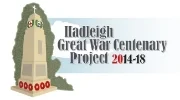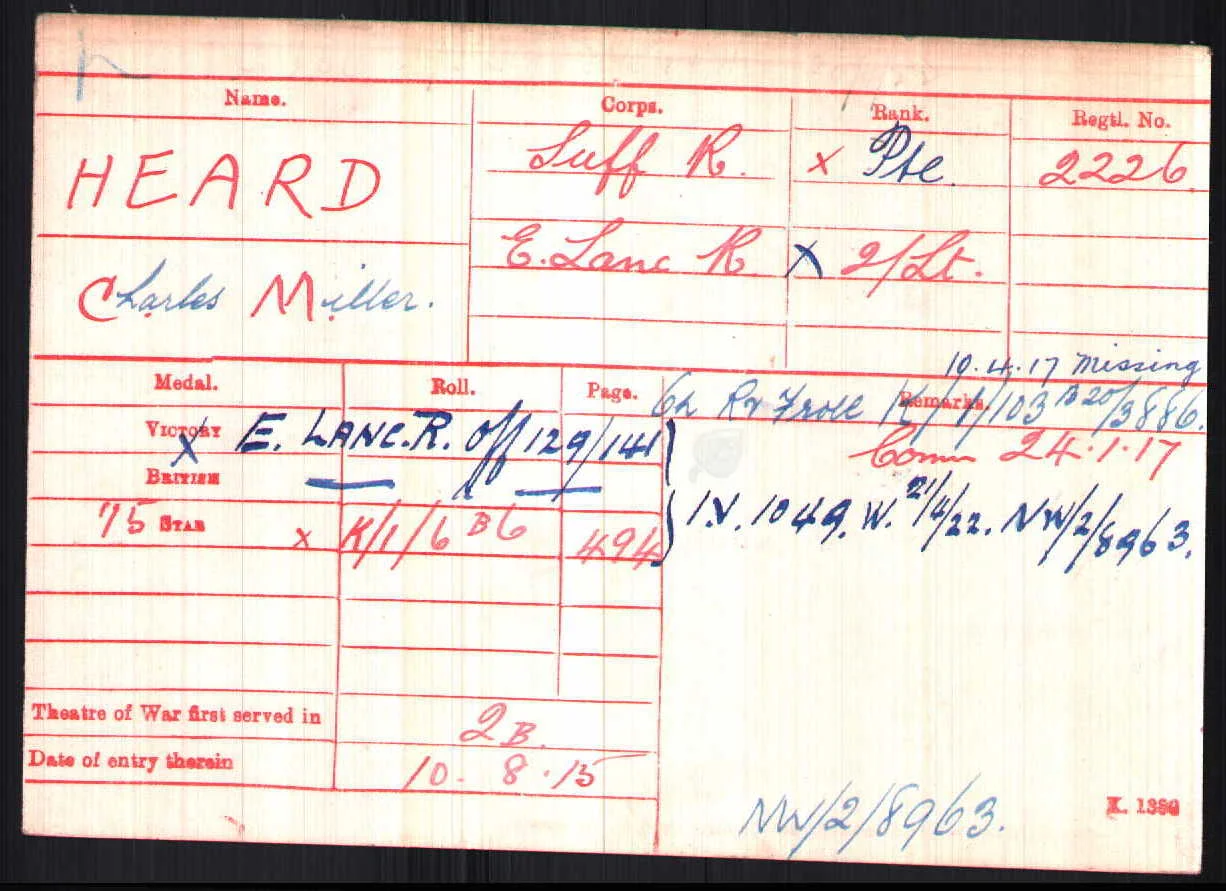Charles Miller Heard
Rank: Private / 2nd Lieutenant
Service Number: 2226
Date of Birth: 1893
Regiment: Suffolk Regt / East Lancashire Regiment
Date of Death: 10 April 1917
Age at death: 24
Cemetery / Memorial: Arras Memorial
Country: France
Grave / Reference: Bay 6
Relatives: Son of Edwin George and Mary Heard
Address: 43 Benton Street, Hadleigh
Charles was born on 6 Jan 1893 at Hatfield Peverel, Essex. By 1901 he was aged 8 and living at home with his parents; Edwin (44) and Mary (42)and siblings; Edwin (14), Nesta (9), Eileen (5) and Nina (2) at 43 Benton Street. His father worked for the Great Eastern Railway and was the Station Master at Hadleigh. By 1911 Charles was training to be a teacher and was in lodgings in Bury St Edmunds.
The whereabouts of Charles' medals are currently unknown, but he was entitled to the 1915 Star, the British War medal and the Victory medal
Charles joined the local territorial battalion, the 5th Suffolks at the outbreak of war. The Suffolks were mobilised at the outbreak of war and spent a number of months carrying out home service tasks. At that time territorial units were only liable for home service only and were not required to deploy overseas. However, when it became apparent that more troops would be needed for overseas service, the men of the battalion were asked to volunteer. After giving this some serious thought, 72% of the men volunteered and the battalion was redesigned 1st/5th Suffolk Regiment. Those who opted to stay on home service duties only, became the 2nd/5th Suffolks.
He attended the boys school in Bridge St. Hadleigh from 1 Feb 1900 until 17 May 1907. According to the school registers, he left to go to work. The 1911 shows him in lodgings in Bury St. Edmunds a pupil teacher for the Suffolk County Council. His army file shows that he also trained at the Dartford Technical College.
Landing beach at Suvla Bay
The 1st/5th Suffolks completed their training and preparation and were re-equipped for service in the eastern theatre. They embarked along with the rest of 163 Brigade and the 54 Eastern Division at the end of July from Liverpool bound for Gallipoli. They arrived and went ashore at Suvla Bay on 10th August 1915 and were quickly moved forward and by midday on the 12th were manning the forward trenches on the Anafarta Plain. At 4pm they were ordered forward as part of a 163 Brigade operation to clear the Plain of snipers in preparation for a much larger Divisional operation that was planned for the following day. The battalion was on the left of the brigade line and 'A' Company made up of Hadleigh men were in the first wave. There was at least 75 Hadleigh men involved and this was a true baptism of fire. They were told it would be a straight forward advance to mop up the odd sniper, but in reality they faced a determined and ruthless enemy. The enemy's intimate knowledge of the ground was key. They sniped the Suffolks who could not see the firing points and even if they could, they had no artillery support to combat the snipers. In addition, the Turks made best use of their own artillery which ultimately halted the Brigades advance. The Suffolks fell back to a shallow river bed / ditch where they formed the new front line. A few days later they were relieved and returned to the reserve trenches where they discovered that the attack had cost them dearly; 11 Officers and 178 Other Ranks were killed, wounded or missing.
From Suffolk Free Press of 22 Dec 1915
On commissioning Charles joined the 1st Bn East Lancashire Regt and at some point was attached to the 8th (Service) Bn East Lancashire Regt. The 8th (Service) Bn was formed as part of Kitchener's 3rd Army (K3). They had been in France since July 1915. They were part of 112 Brigade, 37 Division.
The 37 Division took part in the First Battle of the Scarpe from 9 to 14 April 1917. This was a phase of the wider Battle of Arras from 9 April to 16 June 1917. 37 Division were tasked with capturing the small town of Monchy le Preux. It was at some point during this battle that Charles went missing. He was reported missing (presumed dead) on 10 April 1917.
Charles is remembered on the Arras Memorial
Arras Memorial
Charles survived the Gallipoli campaign remained with the Mediterranean Expeditionary Force (MEF) and must have impressed is superior officers. By Jan 1916 he had promoted to Sergeant and on 3 Aug 1916 he left Alexandria on board H.S. Tunisian in order to attend Officer Training Corps at home. He subsequently joined number 12 Officer Cadet Bn at Newmarket on 15 sep 1916 and was eventually commissioned on 25 Jan 1917.
The shaded area shows the ground captured during the 1917 battle of Arras
Every year the Westminster Records Office work with a local school and research a particular soldier. The school are then invited to attend a special remembrance service at Westminster Abbey where they remember their particular subject. In 2015 and because of his connection with Dartford Technical College, a Dartford School chose to research Charles Miller Heard. They very kindly shared their findings with our project.












